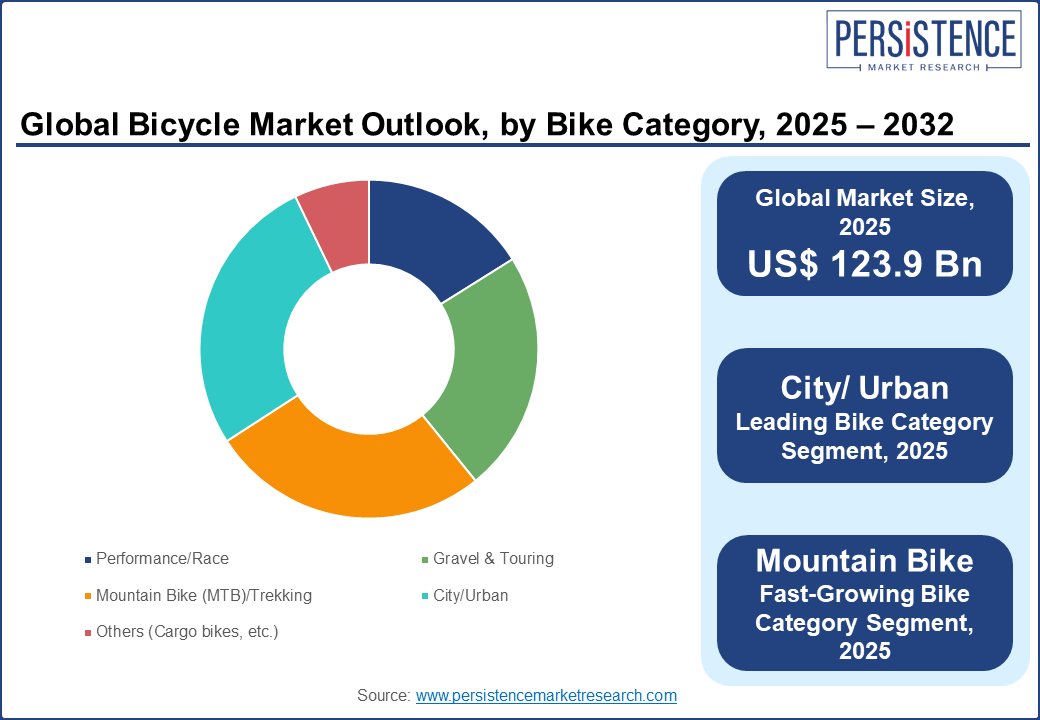- Blog
- Bicycle Market
The Global Bicycle Industry: Pedaling into an Electrified Future
Published On : 28 Oct 2025
The bicycle industry, long seen as a symbol of sustainable mobility, is undergoing a profound transformation driven by technology, policy, and consumer preference. As cities worldwide embrace net-zero transport targets, bicycles—particularly electric models—are redefining the mobility ecosystem once dominated by automobiles.
The bicycle market size is estimated at USD 123.9 billion in 2025, and is expected to reach USD 171.5 billion by 2032, at a CAGR of 4.8% during the forecast period 2025 to 2032
A New Mobility Paradigm
The global bicycle sector has evolved from a traditional, cost-driven segment into a technology-intensive industry. Urbanization, climate action mandates, and the rising demand for micro-mobility have positioned bicycles as an essential component of future transportation strategies. For automotive executives, this shift signals both disruption and opportunity—especially as electric bicycles (e-bikes) capture an expanding share of the commuter base once loyal to compact cars and scooters.
E-bikes now serve as practical alternatives for short-distance travel, offering the convenience of motorized assistance without emissions. The convergence of lightweight materials, advanced lithium-ion batteries, and digital connectivity has significantly enhanced performance, range, and affordability. As a result, the sector is transitioning from leisure and fitness to a mainstream urban mobility solution.
The Electrification Wave
Electric bicycles represent the fastest-growing subsegment of the global two-wheel mobility market. Industry leaders are investing heavily in R&D to integrate AI-driven power management systems, regenerative braking, and smart IoT diagnostics. These innovations mirror the automotive industry’s trajectory toward electrification and connectivity—suggesting a natural alignment between e-bike manufacturers and automakers diversifying into sustainable mobility portfolios.
Notably, automotive brands such as Porsche, BMW, and Yamaha have already established strong e-bike divisions, leveraging their design and battery expertise to enter new consumer segments. This convergence is blurring industry boundaries and enabling cross-sector collaborations that extend beyond traditional vehicle platforms.
Sustainability and Urban Policy Tailwinds
Government regulations and incentive frameworks are accelerating adoption. European nations, including Germany and the Netherlands, are offering tax deductions and purchase subsidies to promote bicycle commuting. Meanwhile, urban planners are redesigning cities around bicycle infrastructure—protected lanes, charging stations, and integrated parking hubs—to reduce congestion and pollution.
For C-suite decision-makers, these developments reinforce the strategic imperative to align corporate roadmaps with sustainable transport goals. Electric bicycles not only diversify mobility portfolios but also position firms as enablers of carbon-neutral urban ecosystems.
Innovation and Competitive Dynamics
The competitive landscape is intensifying as both traditional bicycle manufacturers and new entrants differentiate their products. Advances in drivetrain efficiency, modular battery systems, and smart telemetry are becoming key differentiators. Moreover, subscription-based models and connected fleet analytics are reshaping ownership paradigms, creating recurring revenue streams akin to the automotive sector’s shift toward Mobility-as-a-Service (MaaS).
Partnerships with technology startups specializing in data analytics and connectivity platforms are unlocking further growth potential. Companies that successfully integrate digital ecosystems—spanning GPS tracking, performance analytics, and over-the-air updates—stand to capture long-term market advantage.
Looking Ahead
The future of the global bicycle industry lies at the intersection of electrification, connectivity, and sustainability. For automotive executives, engaging with this evolution is not optional—it’s strategic. Whether through investment, partnerships, or in-house innovation, aligning with the electrified bicycle revolution offers a pathway to growth in a mobility landscape defined by efficiency, zero emissions, and digital intelligence.
Vendor News
Key players operating in the global market for bicycles include Derby Cycle, Tube Investment of India Limited, Dorel Industries Inc., Merida Industry Co. Ltd., Samchuly Bicycle Co., Ltd., Atlas Cycles Ltd., Trek Bicycle Corporation, Avon Cycles Ltd., Tandem Group plc., Zhonglu Co. Ltd., Giant Bicycle Inc., and Accell Group.
Industry Report

Request Report Sample
Your privacy is important to us; your data is secure
Contact Us
Latest Reports
-
Margarine Market by Source (Soybean Oil, Palm Oil, Corn Oil, Sunflower Oil, Canola Oil, Others), by Nature (GMO Margarine, Non-GMO Margarine), by End Use, by Distribution Channel, and Regional Analysis from 2026 - 2033
-
Packaging Adhesives Market by Technology (Water-based, Solvent-based, Hot-melt), Resin (PVA, Acrylics, Polyurethane, Other), Application (Flexible Packaging, Folding Boxes & Cartons, Sealing, Label & Tapes, Other), and Regional Analysis for 2026 - 2033
-
Biologics Safety Testing Market by Product (Kits & Reagents, Instruments, Services), by Test Type (Endotoxin, Sterility, Cell Line Authentication and Characterization, Adventitious Agent Detection, Bioburden, Other), by Application, by Regional Analysis, 2026-2033
-
Rice Husk Ash Market by Silica Content (80-84%, 85-89%, 90-94%, Above 95%), End-user (Steel Industry, Building & Construction, Silica, Ceramics & Refractory, Other), and Regional Analysis for 2026 - 2033
-
Biosimilar Insulin Market by Type of Synthesis (Insulin Glargine, Insulin Analog, Others), Distribution Channel (Hospital Pharmacies, Retail Pharmacies, Online Pharmacies), and Regional Analysis from 2026 to 2033

